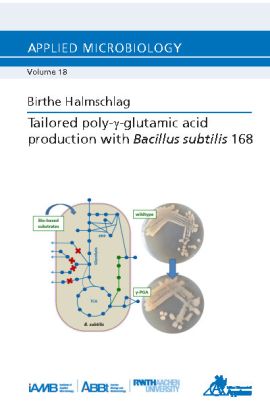Dieses E-Book können Sie hier herunterladen.
Poly-γ-glutamic acid (γ-PGA) is a water-soluble, non-toxic, hygroscopic, and biodegradable polymer with various potential industrial applications. While the applications are manifold, γ-PGA of defined molecular structure is costly. The aim of this thesis was the cost reduced synthesis of tailored γ-PGA by strain and process optimization.
To enable γ-PGA synthesis based on biomass-derived carbon sources, a derivative of the reference strain B. subtilis 168 was used as host. Specifically, the native γ-PGA operon was activated by activating transcription, enabling the strain to produce γ-PGA from glucose as sole carbon source. The metabolic profiles of engineered strains with varying γ-PGA synthesis rates provided new insides into precursor supply, regulation of the intracellular glutamate pool, and metabolic bottlenecks. To direct the metabolic flux from glucose to glutamate and, hence, prevent the limitation of γ-PGA synthesis by precursor supply, genes that encode enzymes producing by-products were deleted. The higher precursor supply caused a higher γ-PGA titer for the deletion mutant, demonstrating the benefit of the genomic modifications.
A cost reduced γ-PGA production can be achieved using hemicellulose-derived substrates such as xylose. γ-PGA producing microorganisms including B. subtilis natively metabolize xylose via the isomerase pathway. The Weimberg pathway, a heterologous xylose utilization, offers a more carbon-efficient alternative converting xylose to 2-oxoglutarate without carbon loss. The engineered B. subtilis strain harboring the Weimberg pathway allowed resource efficient, high yield γ-PGA production from xylose/glucose mixtures.
The γ-PGA synthesized by different Bacillus strains exhibits great structural diversity. To broaden its industrial use, the molecular properties of the synthesized γ-PGA must be controlled. We combined PGA synthetase and glutamate racemase genes from several Bacillus strains to synthesize tailor-made γ-PGA with B. subtilis as production host. The tailored γ-PGA produced with the same microbial chassis covered a broad range of stereochemical composition and molecular weight.
The gained results demonstrated the huge potential of B. subtilis as host organism for sustainable designer-γ-PGA production. The investigations of the metabolism provide new targets to further enhance biopolymer production. The developed strain and cultivation conditions enhance the potential of γ-PGA for the use in industrial applications.
| Autor | Halmschlag, Birthe |
|---|---|
| Lieferzeit | 3-4 Tage |
| Gewicht | 0.339 kg |
| Erscheinungsdatum | 30.03.2020 |
Applied Microbiology
Tailored poly-γ-glutamic acid production with Bacillus subtilis 168 (E-Book)
Kurzbeschreibung
Dieses E-Book können Sie hier herunterladen.
Poly-γ-glutamic acid (γ-PGA) is a biopolymer with various industrial applications. Despite its diverse applications, γ-PGA of defined molecular structure is costly. Sustainable synthesis of designer-γ-PGA was achieved with a B. subtilis 168 derivative as host. In-depth investigations of the metabolism provided new targets for enhanced γ-PGA synthesis. The developed strains and cultivation conditions demonstrate the huge potential of microbial γ-PGA for the use in industrial applications.

